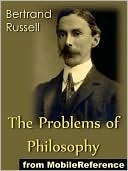When, however, we speak of philosophy as a criticism of knowledge, it is necessary to impose a certain limitation. If we adopt the attitude of the complete sceptic, placing ourselves wholly outside all knowledge, and asking, from this outside position, to be compelled to return within the circle of knowledge, we are demanding what is impossible, and our scepticism can never be refuted. For all refutation must begin with some piece of knowledge which the disputants share; from blank doubt, no argument can begin. Hence the criticism of knowledge which philosophy employs must not be of this
When, however, we speak of philosophy as a criticism of knowledge, it is necessary to impose a certain limitation. If we adopt the attitude of the complete sceptic, placing ourselves wholly outside all knowledge, and asking, from this outside position, to be compelled to return within the circle of knowledge, we are demanding what is impossible, and our scepticism can never be refuted. For all refutation must begin with some piece of knowledge which the disputants share; from blank doubt, no argument can begin. Hence the criticism of knowledge which philosophy employs must not be of this destructive kind, if any result is to be achieved. Against this absolute scepticism, no logical argument can be advanced. But it is not difficult to see that scepticism of this kind is unreasonable. Descartes' 'methodical doubt', with which modern philosophy began, is not of this kind, but is rather the kind of criticism which we are asserting to be the essence of philosophy. His 'methodical doubt' consisted in doubting whatever seemed doubtful; in pausing, with each apparent piece of knowledge, to ask himself whether, on reflection, he could feel certain that he really knew it. This is the kind of criticism which constitutes philosophy. Some knowledge, such as knowledge of the existence of our sense-data, appears quite indubitable, however calmly and thoroughly we reflect upon it. In regard to such knowledge, philosophical criticism does not require that we should abstain from belief. But...
...more
This highlight has been truncated due to consecutive passage length restrictions.


